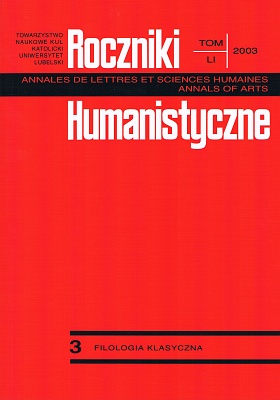Writing/Text versus Dialectic in Platonic Philosophy
Abstract
The study seeks to take a stance in the ongoing discussions on the Platonic philosophy. The subject-matter of the debate is the status of writings in the Platonic philosophy, and to be more precise, to find an answer to the question whether Platonic writings are a reliable source for the re-construction of a “true” Plato’s philosophy. There are two schools: the Tübingen School and the Milan School, which have formulated the so-called “new paradigm” in which to interpret Plato. This paradigm assumes that in the Philosopher’s dialogues we shall not find, explicitly, his “true” knowledge about principles, the one that was lectured in the Academy. The paradigm uses two key arguments, the so-called Platonic “criticisms of the writing” (Faidros, Letter VII), according to which the “true” philosophy, carried out in a living dialectic discourse with a partner or disciple, may not be fixed in the form of writing. The study sought to verify evaluations of particular excerpts from Platonic writings as a criticism of the writing/text, especially the part of the Letter VII. The point is also to reconstruct Platonic dialectic: synoptic dialectic whose point of departure is αἴσqησις (sense perception). This dialectic makes one approve of the necessity of some general concepts understood as models (παραδείγματα). The author defines this dialectic as hypothetical (ὑπόqεσις), for it leads to assume the ontic status of those models understood as transcendent beings. Now, the diaretic (διαίρεσις) dialectic studies general concepts and leads to the definition of individual objects. The analysis of Platonic dialectic on the basis of the writings from the Middle Academy and the Late Academy makes us conclude that dialectic procedures may be realized only in the philosopher's mind, within the area of thinking, in the area of pure concepts, to which the words of discourse, as signs, may only refer. For a discourse is carried on in words which – as the philosopher states in the Kratilos – cannot reflect “the truth of things.” The philosopher-dialectician therefore has no partner. The course and outcomes of a dialectic procedure may be fixed in writing both for didactic, propedeuctic, or protreptic purposes, and such is the purpose of Platonic writings.
References
Gaiser K.: Platons ungeschriebene Lehre. Studien zur systematischen und geschichtlichen Begründung der Wissenschaften in der Platonischen Schule. Stuttgart: Ernst Klett Verlag 1963.
Gajda J.: Platońska droga do idei. Aksjologiczny rodowód platońskiej ontologii. Wrocław: Wydawnictwo Uniwersytetu Wrocławskiego 1993.
Gajda J.: Przedplatońskie koncepcje prawdy. Ontologiczny i aksjologiczny aspekt kategorii ἀλήεια w filozofii przedplatońskiej. Wrocław: Wydawnictwo Uniwersytetu Wrocławskiego 1993. Studia z filozofii starożytnej II.
Gawroński A.: Dlaczego Platon wykluczył poetów z Państwa? Warszawa: PAX 1984.
Hippocrates. De natura hominis. Ed. E. Littré. Paris 1848 (Amsterdam 19622).
Krämer H.: Arete bei Platon und Aristoteles. Zum Wesen und zur Geschichte der platonischen Ontologie. Heidelberg: Carl Winter 1959.
Krämer H.: Das neue Platonbild. „Zeitschrift für philosophische Forschung” 48:1994 s. 1-20.
Kühn W.: La fin du Phèdre de Platon. Critique de la rhétorique et de l’écriture. Firenze: Olschki 1996. Studi dell’Academia Toscana di scienze e lettere.
Kühn W.: Welche Kritik an wesen Schriften. „Zeitschrift für philosophische Forschung” 52:1998 s. 23-39.
Platon. Nowa interpretacja. Materiały z Sympozjum KUL 30 XI – 2 XII 1992. Red. A. Kijewska, E. I. Zieliński. Lublin: RW KUL 1993.
Reale G.: Per una nuova interpretazione di Platone. Milano: Decima 1991.
Szlezak Th.: Gilt Platons Schriftskritik auch für die eigenen Dialoge? Zu einer neuen Deutung von Phaidros 278b 8 e 4. „Zeitschrift für philosophische Forschung” 53:1999 s. 259-267.
Szlezak Th.: Platon lesen. Stuttgart–Bad Cannstadt: Friedrich Fromann Verlag 1993 (przekład polski: Czytanie Platona. Przeł. P. Domański. Warszawa: IFiS PAN 1997).
Copyright (c) 2003 Roczniki Humanistyczne

This work is licensed under a Creative Commons Attribution-NonCommercial-NoDerivatives 4.0 International License.





